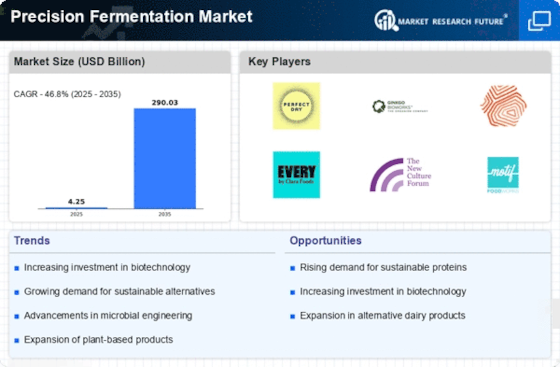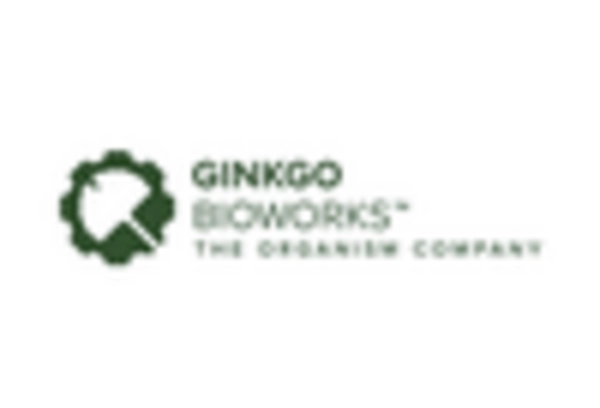Food Production
Animal Feed
Nutraceuticals
Bioplastics
Biofuels
Food Industry
Pharmaceutical Industry
Agricultural Sector
Cosmetics Industry
Bacteria
Yeast
Fungi
Proteins
Enzymes
Vitamins
Amino Acids
North America
Europe
South America
Asia Pacific
Middle East and Africa
North America Outlook (USD Billion, 2019-2035)
Precision Fermentation Market by Application Type
Food Production
Animal Feed
Nutraceuticals
Bioplastics
Biofuels
Precision Fermentation Market by End User Type
Food Industry
Pharmaceutical Industry
Agricultural Sector
Cosmetics Industry
Precision Fermentation Market by Microorganism Type
Bacteria
Yeast
Fungi
Precision Fermentation Market by Product Type
Proteins
Enzymes
Vitamins
Amino Acids
Precision Fermentation Market by Regional Type
US
Canada
US Outlook (USD Billion, 2019-2035)
Precision Fermentation Market by Application Type
Food Production
Animal Feed
Nutraceuticals
Bioplastics
Biofuels
Precision Fermentation Market by End User Type
Food Industry
Pharmaceutical Industry
Agricultural Sector
Cosmetics Industry
Precision Fermentation Market by Microorganism Type
Bacteria
Yeast
Fungi
Precision Fermentation Market by Product Type
Proteins
Enzymes
Vitamins
Amino Acids
CANADA Outlook (USD Billion, 2019-2035)
Precision Fermentation Market by Application Type
Food Production
Animal Feed
Nutraceuticals
Bioplastics
Biofuels
Precision Fermentation Market by End User Type
Food Industry
Pharmaceutical Industry
Agricultural Sector
Cosmetics Industry
Precision Fermentation Market by Microorganism Type
Bacteria
Yeast
Fungi
Precision Fermentation Market by Product Type
Proteins
Enzymes
Vitamins
Amino Acids
Europe Outlook (USD Billion, 2019-2035)
Precision Fermentation Market by Application Type
Food Production
Animal Feed
Nutraceuticals
Bioplastics
Biofuels
Precision Fermentation Market by End User Type
Food Industry
Pharmaceutical Industry
Agricultural Sector
Cosmetics Industry
Precision Fermentation Market by Microorganism Type
Bacteria
Yeast
Fungi
Precision Fermentation Market by Product Type
Proteins
Enzymes
Vitamins
Amino Acids
Precision Fermentation Market by Regional Type
Germany
UK
France
Russia
Italy
Spain
Rest of Europe
GERMANY Outlook (USD Billion, 2019-2035)
Precision Fermentation Market by Application Type
Food Production
Animal Feed
Nutraceuticals
Bioplastics
Biofuels
Precision Fermentation Market by End User Type
Food Industry
Pharmaceutical Industry
Agricultural Sector
Cosmetics Industry
Precision Fermentation Market by Microorganism Type
Bacteria
Yeast
Fungi
Precision Fermentation Market by Product Type
Proteins
Enzymes
Vitamins
Amino Acids
UK Outlook (USD Billion, 2019-2035)
Precision Fermentation Market by Application Type
Food Production
Animal Feed
Nutraceuticals
Bioplastics
Biofuels
Precision Fermentation Market by End User Type
Food Industry
Pharmaceutical Industry
Agricultural Sector
Cosmetics Industry
Precision Fermentation Market by Microorganism Type
Bacteria
Yeast
Fungi
Precision Fermentation Market by Product Type
Proteins
Enzymes
Vitamins
Amino Acids
FRANCE Outlook (USD Billion, 2019-2035)
Precision Fermentation Market by Application Type
Food Production
Animal Feed
Nutraceuticals
Bioplastics
Biofuels
Precision Fermentation Market by End User Type
Food Industry
Pharmaceutical Industry
Agricultural Sector
Cosmetics Industry
Precision Fermentation Market by Microorganism Type
Bacteria
Yeast
Fungi
Precision Fermentation Market by Product Type
Proteins
Enzymes
Vitamins
Amino Acids
RUSSIA Outlook (USD Billion, 2019-2035)
Precision Fermentation Market by Application Type
Food Production
Animal Feed
Nutraceuticals
Bioplastics
Biofuels
Precision Fermentation Market by End User Type
Food Industry
Pharmaceutical Industry
Agricultural Sector
Cosmetics Industry
Precision Fermentation Market by Microorganism Type
Bacteria
Yeast
Fungi
Precision Fermentation Market by Product Type
Proteins
Enzymes
Vitamins
Amino Acids
ITALY Outlook (USD Billion, 2019-2035)
Precision Fermentation Market by Application Type
Food Production
Animal Feed
Nutraceuticals
Bioplastics
Biofuels
Precision Fermentation Market by End User Type
Food Industry
Pharmaceutical Industry
Agricultural Sector
Cosmetics Industry
Precision Fermentation Market by Microorganism Type
Bacteria
Yeast
Fungi
Precision Fermentation Market by Product Type
Proteins
Enzymes
Vitamins
Amino Acids
SPAIN Outlook (USD Billion, 2019-2035)
Precision Fermentation Market by Application Type
Food Production
Animal Feed
Nutraceuticals
Bioplastics
Biofuels
Precision Fermentation Market by End User Type
Food Industry
Pharmaceutical Industry
Agricultural Sector
Cosmetics Industry
Precision Fermentation Market by Microorganism Type
Bacteria
Yeast
Fungi
Precision Fermentation Market by Product Type
Proteins
Enzymes
Vitamins
Amino Acids
REST OF EUROPE Outlook (USD Billion, 2019-2035)
Precision Fermentation Market by Application Type
Food Production
Animal Feed
Nutraceuticals
Bioplastics
Biofuels
Precision Fermentation Market by End User Type
Food Industry
Pharmaceutical Industry
Agricultural Sector
Cosmetics Industry
Precision Fermentation Market by Microorganism Type
Bacteria
Yeast
Fungi
Precision Fermentation Market by Product Type
Proteins
Enzymes
Vitamins
Amino Acids
APAC Outlook (USD Billion, 2019-2035)
Precision Fermentation Market by Application Type
Food Production
Animal Feed
Nutraceuticals
Bioplastics
Biofuels
Precision Fermentation Market by End User Type
Food Industry
Pharmaceutical Industry
Agricultural Sector
Cosmetics Industry
Precision Fermentation Market by Microorganism Type
Bacteria
Yeast
Fungi
Precision Fermentation Market by Product Type
Proteins
Enzymes
Vitamins
Amino Acids
Precision Fermentation Market by Regional Type
China
India
Japan
South Korea
Malaysia
Thailand
Indonesia
Rest of APAC
CHINA Outlook (USD Billion, 2019-2035)
Precision Fermentation Market by Application Type
Food Production
Animal Feed
Nutraceuticals
Bioplastics
Biofuels
Precision Fermentation Market by End User Type
Food Industry
Pharmaceutical Industry
Agricultural Sector
Cosmetics Industry
Precision Fermentation Market by Microorganism Type
Bacteria
Yeast
Fungi
Precision Fermentation Market by Product Type
Proteins
Enzymes
Vitamins
Amino Acids
INDIA Outlook (USD Billion, 2019-2035)
Precision Fermentation Market by Application Type
Food Production
Animal Feed
Nutraceuticals
Bioplastics
Biofuels
Precision Fermentation Market by End User Type
Food Industry
Pharmaceutical Industry
Agricultural Sector
Cosmetics Industry
Precision Fermentation Market by Microorganism Type
Bacteria
Yeast
Fungi
Precision Fermentation Market by Product Type
Proteins
Enzymes
Vitamins
Amino Acids
JAPAN Outlook (USD Billion, 2019-2035)
Precision Fermentation Market by Application Type
Food Production
Animal Feed
Nutraceuticals
Bioplastics
Biofuels
Precision Fermentation Market by End User Type
Food Industry
Pharmaceutical Industry
Agricultural Sector
Cosmetics Industry
Precision Fermentation Market by Microorganism Type
Bacteria
Yeast
Fungi
Precision Fermentation Market by Product Type
Proteins
Enzymes
Vitamins
Amino Acids
SOUTH KOREA Outlook (USD Billion, 2019-2035)
Precision Fermentation Market by Application Type
Food Production
Animal Feed
Nutraceuticals
Bioplastics
Biofuels
Precision Fermentation Market by End User Type
Food Industry
Pharmaceutical Industry
Agricultural Sector
Cosmetics Industry
Precision Fermentation Market by Microorganism Type
Bacteria
Yeast
Fungi
Precision Fermentation Market by Product Type
Proteins
Enzymes
Vitamins
Amino Acids
MALAYSIA Outlook (USD Billion, 2019-2035)
Precision Fermentation Market by Application Type
Food Production
Animal Feed
Nutraceuticals
Bioplastics
Biofuels
Precision Fermentation Market by End User Type
Food Industry
Pharmaceutical Industry
Agricultural Sector
Cosmetics Industry
Precision Fermentation Market by Microorganism Type
Bacteria
Yeast
Fungi
Precision Fermentation Market by Product Type
Proteins
Enzymes
Vitamins
Amino Acids
THAILAND Outlook (USD Billion, 2019-2035)
Precision Fermentation Market by Application Type
Food Production
Animal Feed
Nutraceuticals
Bioplastics
Biofuels
Precision Fermentation Market by End User Type
Food Industry
Pharmaceutical Industry
Agricultural Sector
Cosmetics Industry
Precision Fermentation Market by Microorganism Type
Bacteria
Yeast
Fungi
Precision Fermentation Market by Product Type
Proteins
Enzymes
Vitamins
Amino Acids
INDONESIA Outlook (USD Billion, 2019-2035)
Precision Fermentation Market by Application Type
Food Production
Animal Feed
Nutraceuticals
Bioplastics
Biofuels
Precision Fermentation Market by End User Type
Food Industry
Pharmaceutical Industry
Agricultural Sector
Cosmetics Industry
Precision Fermentation Market by Microorganism Type
Bacteria
Yeast
Fungi
Precision Fermentation Market by Product Type
Proteins
Enzymes
Vitamins
Amino Acids
REST OF APAC Outlook (USD Billion, 2019-2035)
Precision Fermentation Market by Application Type
Food Production
Animal Feed
Nutraceuticals
Bioplastics
Biofuels
Precision Fermentation Market by End User Type
Food Industry
Pharmaceutical Industry
Agricultural Sector
Cosmetics Industry
Precision Fermentation Market by Microorganism Type
Bacteria
Yeast
Fungi
Precision Fermentation Market by Product Type
Proteins
Enzymes
Vitamins
Amino Acids
South America Outlook (USD Billion, 2019-2035)
Precision Fermentation Market by Application Type
Food Production
Animal Feed
Nutraceuticals
Bioplastics
Biofuels
Precision Fermentation Market by End User Type
Food Industry
Pharmaceutical Industry
Agricultural Sector
Cosmetics Industry
Precision Fermentation Market by Microorganism Type
Bacteria
Yeast
Fungi
Precision Fermentation Market by Product Type
Proteins
Enzymes
Vitamins
Amino Acids
Precision Fermentation Market by Regional Type
Brazil
Mexico
Argentina
Rest of South America
BRAZIL Outlook (USD Billion, 2019-2035)
Precision Fermentation Market by Application Type
Food Production
Animal Feed
Nutraceuticals
Bioplastics
Biofuels
Precision Fermentation Market by End User Type
Food Industry
Pharmaceutical Industry
Agricultural Sector
Cosmetics Industry
Precision Fermentation Market by Microorganism Type
Bacteria
Yeast
Fungi
Precision Fermentation Market by Product Type
Proteins
Enzymes
Vitamins
Amino Acids
MEXICO Outlook (USD Billion, 2019-2035)
Precision Fermentation Market by Application Type
Food Production
Animal Feed
Nutraceuticals
Bioplastics
Biofuels
Precision Fermentation Market by End User Type
Food Industry
Pharmaceutical Industry
Agricultural Sector
Cosmetics Industry
Precision Fermentation Market by Microorganism Type
Bacteria
Yeast
Fungi
Precision Fermentation Market by Product Type
Proteins
Enzymes
Vitamins
Amino Acids
ARGENTINA Outlook (USD Billion, 2019-2035)
Precision Fermentation Market by Application Type
Food Production
Animal Feed
Nutraceuticals
Bioplastics
Biofuels
Precision Fermentation Market by End User Type
Food Industry
Pharmaceutical Industry
Agricultural Sector
Cosmetics Industry
Precision Fermentation Market by Microorganism Type
Bacteria
Yeast
Fungi
Precision Fermentation Market by Product Type
Proteins
Enzymes
Vitamins
Amino Acids
REST OF SOUTH AMERICA Outlook (USD Billion, 2019-2035)
Precision Fermentation Market by Application Type
Food Production
Animal Feed
Nutraceuticals
Bioplastics
Biofuels
Precision Fermentation Market by End User Type
Food Industry
Pharmaceutical Industry
Agricultural Sector
Cosmetics Industry
Precision Fermentation Market by Microorganism Type
Bacteria
Yeast
Fungi
Precision Fermentation Market by Product Type
Proteins
Enzymes
Vitamins
Amino Acids
MEA Outlook (USD Billion, 2019-2035)
Precision Fermentation Market by Application Type
Food Production
Animal Feed
Nutraceuticals
Bioplastics
Biofuels
Precision Fermentation Market by End User Type
Food Industry
Pharmaceutical Industry
Agricultural Sector
Cosmetics Industry
Precision Fermentation Market by Microorganism Type
Bacteria
Yeast
Fungi
Precision Fermentation Market by Product Type
Proteins
Enzymes
Vitamins
Amino Acids
Precision Fermentation Market by Regional Type
GCC Countries
South Africa
Rest of MEA
GCC COUNTRIES Outlook (USD Billion, 2019-2035)
Precision Fermentation Market by Application Type
Food Production
Animal Feed
Nutraceuticals
Bioplastics
Biofuels
Precision Fermentation Market by End User Type
Food Industry
Pharmaceutical Industry
Agricultural Sector
Cosmetics Industry
Precision Fermentation Market by Microorganism Type
Bacteria
Yeast
Fungi
Precision Fermentation Market by Product Type
Proteins
Enzymes
Vitamins
Amino Acids
SOUTH AFRICA Outlook (USD Billion, 2019-2035)
Precision Fermentation Market by Application Type
Food Production
Animal Feed
Nutraceuticals
Bioplastics
Biofuels
Precision Fermentation Market by End User Type
Food Industry
Pharmaceutical Industry
Agricultural Sector
Cosmetics Industry
Precision Fermentation Market by Microorganism Type
Bacteria
Yeast
Fungi
Precision Fermentation Market by Product Type
Proteins
Enzymes
Vitamins
Amino Acids
REST OF MEA Outlook (USD Billion, 2019-2035)
Precision Fermentation Market by Application Type
Food Production
Animal Feed
Nutraceuticals
Bioplastics
Biofuels
Precision Fermentation Market by End User Type
Food Industry
Pharmaceutical Industry
Agricultural Sector
Cosmetics Industry
Precision Fermentation Market by Microorganism Type
Bacteria
Yeast
Fungi
Precision Fermentation Market by Product Type
Proteins
Enzymes
Vitamins
Amino Acids



















Leave a Comment